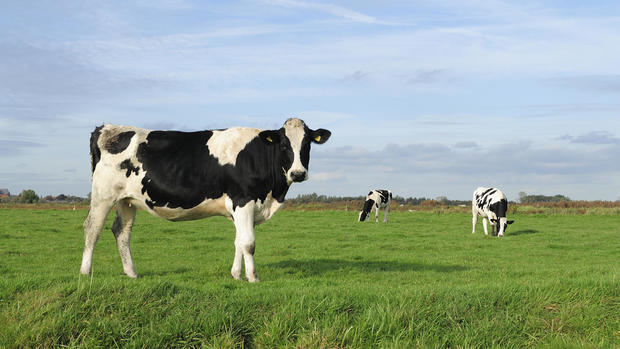
Avian flu confirmed in a Colorado farmworker, marking fourth human case in U.S. since March
Bird flu confirmed in a Colorado farmworker
00:15
A case of H5 influenza, also known as bird flu or avian influenza, has been confirmed in a man who was working at a dairy farm in northeastern Colorado. That’s according to the Colorado Department of Public Health and Environment, which said it is the fourth confirmed human case in the United States since an outbreak among cows that appears to have started in March.
VLIET/Getty Images
The man was working in Northern Colorado and had direct contact with cattle that were infected with avian flu. To this point, the only U.S. cases have been among farmworkers.
The CDPHE says the person who tested positive for the avian flu only had one symptom — pink eye, otherwise known as conjunctivitis. He was tested after reporting his symptoms and received an antiviral treatment with oseltamivir afterwards. Those are the Centers for Disease Control and Prevention’s recommended steps when there’s a confirmed human case. The man, whose identity is not being released, has recovered.
briefing with rural doctors last month.
It is unclear whether the man was wearing personal protective equipment.
“Our partnership with the Colorado Department of Agriculture has been crucial in disseminating information to dairy farmers across the state,” Hunsaker Ryan said.
The three other confirmed human cases of avian flu since the March outbreak in cattle were found in Texas and Michigan.
Anyone who has been working with dairy cows and begins to feel sick with possible avian flu symptoms should call the CDPHE at 303-692-2700 during the day or 303-370-9395 after hours.
More information about avian flu can be found on the Colorado Department of Public Health and Environment’s website.
News of the case comes as federal officials are now debating whether and when to deploy 4.8 million doses of bird flu vaccine that are being filled into vials this summer. Finland announced last month it would offer shots to workers who might be exposed to the virus.
Vaccinating farm workers?
U.S. officials say manufacturing of the vaccines is expected to be done by August.
Vaccinemaker CSL Seqirus says it is still in talks with the Food and Drug Administration to clear use of their shots in humans. After that, it would be up to the CDC to decide whether to roll out the shots for farm workers.
“No final decisions are made, but we are in the process of robust discussion,” the CDC’s Principal Deputy Director Dr. Nirav Shah told reporters on Tuesday.
Shah said the vaccine debate hinges in part on whether more distribution of flu treatments might be a better alternative.
“If our goal is to reduce the number of infections that may occur, we have to wonder whether vaccination is the best route for that, or whether there may be other routes that are faster or even more effective such as, as I mentioned, more widespread use of antivirals,” said Shah.
Officials are also discussing other measures to help workers infected with the virus, Shah added, including the possibility of offering financial help with sick leave and further outreach.
Farm workers may also not be willing to get the shots, even if they were to become eligible for vaccination.
“If right now, H5 is not perceived as a pressing threat among farm workers, and I’m not speculating as to whether it is or not, but if that is the case, then uptake may not be robust,” said Shah.
Jesse Sarles
Source: cbsnews.com